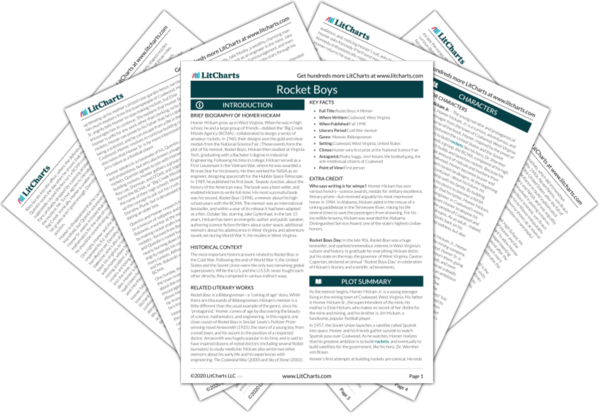Rocket Boys takes place in the late 1950s and early 1960s, at the height of the Cold War—so to understand Rocket Boys, it’s crucial to understand the Cold War and its ramifications for American society.
Following World War II, the United States—a capitalist, democratic state—and the Soviet Union, or U.S.S.R.—a Communist state—became the two global superpowers. While the U.S. and the U.S.S.R. never directly fought with one another, they came close on many occasions—hence the term “Cold War.” One of the most famous of these occasions was the Cuban Missile Crisis of 1962, during which the U.S.S.R. shipped nuclear missiles to Cuba and aimed them at the United States. For nearly two weeks, the United States “stood its ground” against the Soviet Union, threatening to fire nuclear weapons on its territories if the Soviet Union persisted in keeping nuclear weapons in Cuba. Ultimately, both sides agreed to remove some of their weapons.
Science, mathematics, and technology were of the utmost important during the Cold War, particularly in the Space Race, a decade-long competition between Russia and America to build superior rockets and satellites, and send astronauts on increasingly challenging missions. The Space Race began in 1957, when the Soviet Union’s launched Sputnik—a small satellite that was the first to enter into orbit of the Earth, a technological achievement that implicitly proclaimed the Soviet Union’s scientific superiority to the United States. In response, the United States began building satellites and rockets of its own. The effects of these efforts trickled down even into American high schools, as the federal government began aggressively funding math and science classes, assigning more tests, and setting higher standards. Science and math were no longer seen as “nerdy,” esoteric activities—they were instead seen as patriotic duties, vital to the Cold War effort.
The influence of the Cold War and the Space Race on American society is apparent on every page of Rocket Boys. At the beginning of the book, prior to the launch of Sputnik, Homer and his friends are widely perceived as weak, effeminate, and more or less useless. Gradually, however, Homer and his friends gain respect by building impressive, efficient rockets, because rockets have become “cool”—especially as the American government spends millions of dollars on rockets in Cape Canaveral, offers generous engineering scholarships, and generally encourages young Americans to embrace physics and chemistry. One illustration of this comes towards the end of the novel, when an obnoxious classmate of Homer’s, Calvin, chases after Homer, demanding to talk to him. At first, Homer thinks that Calvin is trying to beat him up, but then he realizes the truth: Calvin wants Homer to help him get a job working with rockets in Cape Canaveral.
The symbolism is clear: rockets, science, and math were “sissy” activities before Sputnik—now, they’re a respectable career path, a way for young people to escape their dull lives in Coalwood. In the Cold War era, America changed its mind about what was valuable and what was a waste of time, and Homer and his friends are the beneficiaries of this change.
The Cold War and the Space Race ThemeTracker

The Cold War and the Space Race Quotes in Rocket Boys
“As I’m sure you know by now,” Mr. Turner said in his deliberate manner, “the Russians have launched a satellite into space. There have been many calls for the United states to do something in response. The Big Creek Student Council today has responded to, and I quote, the ‘threat of Sputnik’ by passing a resolution—I have it in my hand now—that dedicates the remainder of the school year to academic excellence. I approve the council’s resolution.”
The men crossed the tracks and I saw the glint of their lunch buckets in the tipple light, and I came slowly back to reality. They weren’t explorers on the moon, just Coalwood miners going to work. And I wasn’t on von Braun’s team. I was a boy in Coalwood, West Virginia. All of a sudden, that wasn’t good enough.
Instead of swaggering heroically through the halls in their green and white letter jackets, Jim and the football boys trudged to class sullen and trigger-sensitive to insult.
“Mining’s in your blood, little man,” he shrugged. “I guess you’ll figure that out, sooner or later.”
“I still want to work for Dr. von Braun.”
He nodded. “We’ll see.”
Kennedy seemed to be energized by the response. “If I’m elected president,” he said, “I think maybe we will go to the moon.”
















